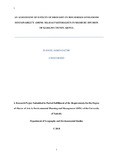| dc.description.abstract | In the dry lands of Africa, range pastoralism is often the main source of livelihood and a way of life. However, frequent droughts often adversely affect dry land livestock economies and livelihoods in ways that can be far reaching and even devastating. This study sought to establish adverse effects of perennial drought on livelihoods of Maasai households. Specifically, the study sought to: 1) identify factors that determine vulnerability of livestock production to drought; 2) analyze strategies adopted by the Maasai households to cope with drought; 3) identify opportunities that can be used to promote drought-resilient Maasai pastoralism; 4) recommend ways to promote livelihood security among Maasai households in the face of recurrent drought. Using a cross-sectional study design, data were collected by use of questionnaires, key informant interviews and observation techniques.
The results showed that dry conditions, increased land sub-division, over dependency on livestock for a living, low formal educational levels and human activities such as mining, sand harvesting, deforestation are the main factors that increase vulnerability of Maasai households to drought. Maasai households adopts various strategies in order to cope with effects of drought including livelihood diversification (such as crop farming), seeking paid employment opportunities, going into retail business ventures (dukas); bead making and selling, charcoal burning and sand harvesting. Other strategies included: livestock mobility in search of forage and water, diversification of herd composition (to increase herd resilience and reduce losses), getting formal schooling for children as a long term coping strategy to increase household employment income and boost chances of drought recovery through restocking. The study rejected the hypothesis that frequent and increasingly severe droughts haven’t affected the ability of pastoral household in generating and maintaining a sustainable livelihood through rangeland livestock production, leading to the conclusion that the droughts | en_US |



